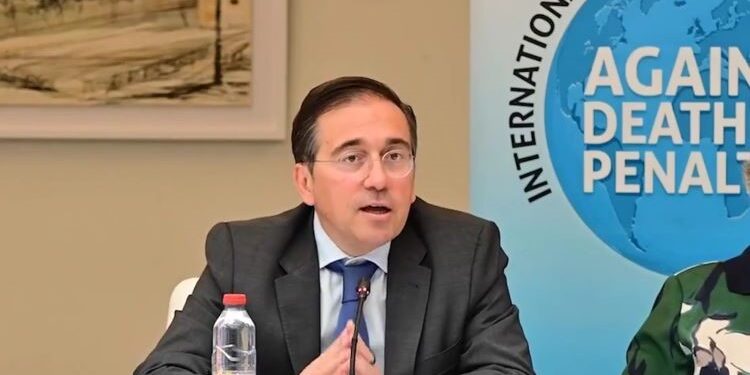Eduardo González
The Minister of Foreign Affairs, José Manuel Albares, received the members of the International Commission Against the Death Penalty this Tuesday in Madrid. He supported the transformation of this entity, promoted by the Spanish government in 2010, into a “fully developed international organization.”
“Spain greatly values the efforts the Commission is making in the fight for the abolition of the death penalty worldwide,” Albares stated during the meeting, which took place at the Ministry’s headquarters in Marqués de Salamanca.
The death penalty, he continued, “is a practice that we consider, under all circumstances, in all cases, cruel, inhuman, degrading, and incompatible with the right to life and human dignity.” “Unfortunately, this fight, which never goes away, is more necessary than ever,” he added.
“I wish to thank you for the hard work carried out over the last year with the Commission,” he continued. “This year, part of its debate has focused on transforming the International Commission against the Death Penalty into a fully developed international organization,” he recalled. “I welcome this decision. Spain supports it,” he stated.
The Commission, according to Albares, “faces difficulties due to its current legal status as a non-profit association under Spanish law, particularly with regard to financial limitations and the difficulty in participating effectively in multilateral forums.” Therefore, “this new status will open up new avenues to make its work even more efficient,” he concluded.
The International Commission against the Death Penalty (ICDP), established on October 7, 2010, in Madrid at the initiative of the Spanish government, is made up of 16 commissioners with human rights experience and committed to the global abolition of the death penalty. The Commission enjoys the political and financial support of a diverse group of countries from all regions of the world.
It is currently chaired by Navi Pillay, United Nations High Commissioner for Human Rights from 2008 to 2014, a former judge at the International Criminal Court, and former President of the International Criminal Tribunal for Rwanda. Its commissioners include Michelle Bachelet (former President of Chile and former United Nations High Commissioner for Human Rights), Helen Clark (former Prime Minister of New Zealand), and Gloria Macapagal-Arroyo (former President of the Philippines). Its honorary members include former Spanish Prime Minister José Luis Rodríguez Zapatero. One of its founders was the late Spaniard Federico Mayor Zaragoza.







